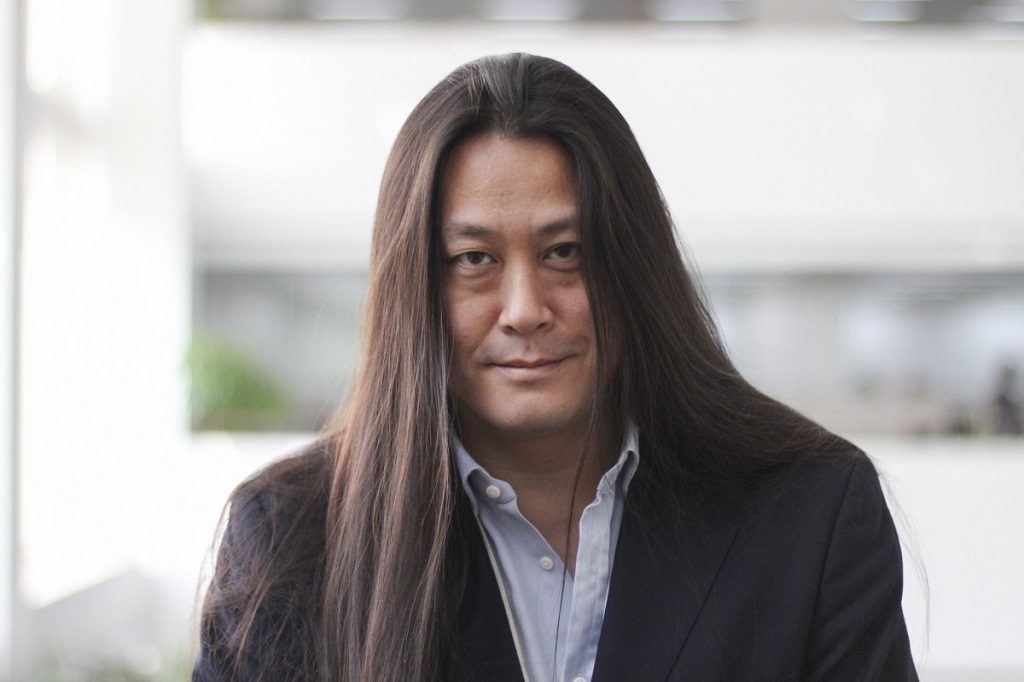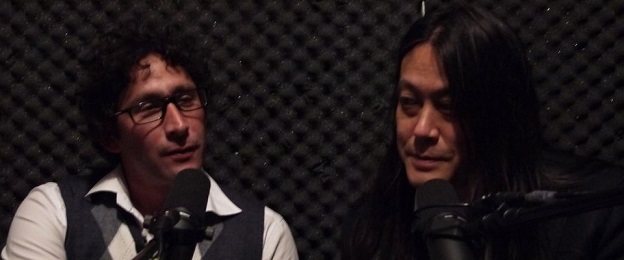A conversation with Kaiser Kuo (Sinica, SupChina) - Part 1 - SOAS China Institute
A conversation with Kaiser Kuo (Sinica, SupChina) - Part 1

By Eleonora Di Benedetto in conversation with Kaiser Kuo | 02 December 2020
China has been a hot topic since the SARS-CoV-2 strain responsible for the coronavirus pandemic was reportedly first discovered in Wuhan, China, in December 2019.
How is China being discussed by the media in the ‘Western world’ and how is this affecting the way people perceive China? I spoke to Kaiser Kuo, editor-at-large of the New York-based, China-focused news, information, and business services platform SupChina, and co-founder of China current affairs podcast Sinica.
This is a transcript of part one of our interview. Read part two here.
(Eleonora Di Benedetto): What would you say motivated you to start producing content for Sinica and SupChina?
(Kaiser Kuo): We started the Sinica podcast in 2010 and it really was a very spontaneous decision. Jeremy Goldkorn and I had been friends for a number of years already – both of us had been living in Beijing, I had been there since 1996 but had lived there for a couple of years prior to that as well, Jeremy had been there since 1995 – so we had both been there for almost 15 years.
At the time that we started it, podcasts were popular with a certain set of people. There were people who listened to podcasts, but they didn’t have nearly the ubiquity that they have right now. They weren’t something that everyone knew how to access, download… they weren’t so popular.
 So, we were talking about podcasts, both of us were really interested in technology, in media especially, so it was a natural kind of conversation over beers – and he asked me or I asked him (I don’t remember which is which) ‘What podcasts do you currently listen to?’ and both of us ran our lists of familiar titles that were popular back then. Then, I think it was me that asked ‘So… what about China-related podcasts? Are you aware of any, are there any that you listen to?’. I don’t remember who suggested ‘Why don’t we do one?’ but it made a lot of sense, both of us were very well-connected – we knew a lot of people who were either ‘hobby’ China watchers, bloggers, journalists, analysts at various companies and people that were pretty engaged and were able to talk about China, such as experts on different fields. So, we said ‘Yeah, let’s do it’.
So, we were talking about podcasts, both of us were really interested in technology, in media especially, so it was a natural kind of conversation over beers – and he asked me or I asked him (I don’t remember which is which) ‘What podcasts do you currently listen to?’ and both of us ran our lists of familiar titles that were popular back then. Then, I think it was me that asked ‘So… what about China-related podcasts? Are you aware of any, are there any that you listen to?’. I don’t remember who suggested ‘Why don’t we do one?’ but it made a lot of sense, both of us were very well-connected – we knew a lot of people who were either ‘hobby’ China watchers, bloggers, journalists, analysts at various companies and people that were pretty engaged and were able to talk about China, such as experts on different fields. So, we said ‘Yeah, let’s do it’.
Jeremy and I were acquainted with a guy by the name of David Lancashire. David was a graduate student at that time and he had been living in Beijing for awhile and he’d started a little company that did Chinese language instruction and was using the podcast medium to do it, they were having voice actors coming in and recording conversations and distributing it via podcast. He had a studio, he knew how to make podcasts, he knew how to distribute them and we approached him – he was just delighted to work with us because he figured that people who were interested in hearing a show about current affairs in China might also be interested in learning the language, so he figured he would get some additional business for his language learning platform. At the same time, we figured that people who were learning the Chinese language might be interested in listening to our current affairs show about China. So, on April 1st 2010, we sat down with Bill Bishop in the studio and we started talking about Google’s pull out from China.
The podcast worked pretty nicely. It was very loosely structured and it’s basically retained that same format ever since, just a conversation, usually Jeremy and me, with one or two other guests and focused on specific topics.

Were you dissatisfied with the quality of media coverage of China?
Yes and no, I think that’s a very difficult question to answer.
The dissatisfaction arises not because I think that journalists themselves are either incapable or dishonest or biased or have an agenda to make China look bad or to cover it unfairly, but rather from structural issues in Western-style journalism, specifically American-style journalism. I think that while they can be very accurate and factual, at the same time they never paint what amounts to a realistic picture, because they simply don’t have either the space, the time and the resources to provide all of the context that somebody who lives in China, who knows China, who’s studied China extensively automatically brings.
So, an ordinary reader whose knowledge of China is basically limited to other media coverage will often be unable to assimilate new coverage about China into their understanding and, unfortunately, that coverage (again, because of structural reasons) tends to be on things that are anything but ordinary – it’s never going to be dog bites man, it will always be the man bites dog stories. It will always be stories about repression, authoritarianism, surveillance, technologies, it’ll be things that hold power to account.
And that is a model of journalism that works very, very well, I think, when the reader also has a lot of the other context. So, if I pick a copy of the NYT I am going to read of lot of stories about things that are going horribly wrong in this country and yet, I don’t expect that I’m going to open my window and hear the sound of street fighting, of battles or smell of burning tyres because I kind of know what the rest of life here in America is actually like and I can adjust accordingly. People who are reading the five or six stories in a given day in a newspaper about China aren’t going to have that context and so their knowledge will be limited to the extraordinary, so we end up having the situation where all stories are either ‘big China’, ‘bad China’ or ‘weird China’. According to Jamil Anderlini of the FT, he’s absolutely right that that tends to be the way that it’s covered.
You have an essay in the August 2019 edition of the PRC History Review, titled ‘Talking China: Podcasting and pedagogy on Sinica‘, in which you conceptualise ‘cognitive empathy’ as an approach to understanding phenomena in a more holistic way. Can you elaborate on what cognitive empathy means to you and its relationship with how non-Chinese people make sense of today’s China?
There are two types of empathy we know. There’s your ordinary, emotional empathy – most people understand how to connect in a very basic level with other people emotionally. But when we’re talking about something complicated like a national experience, then you have to actually know quite a bit about the other person’s lived experience, about their assumptions, about their values, about the history that shaped all those things and then you have to actually spend some mental energy to read, to talk to people, to gain some insight through the context and through the history – and that is a quality that I think is really necessary to understand, especially when you’re in a fraught, adversarial or competitive relationship with another country, what the world looks like through their eyes and through their windows. And the only way to do that, in the case of something like an entity as complex as China, is to actually spend a lot of time into learning about that. And that’s why I think cognitive empathy is especially important, the key, and it’s not just with China – I think it’s something that we can exercise in our daily life.
Do you think people in Western countries at the moment have much cognitive empathy for China?
No, I don’t. I think there are some who do and I always really appreciate it and try to hold it up as exemplary when I do see it being exercised. But too often I do not – instead, there is this assumption that there is this rigid set of ethical and moral norms and standards to which China and all the other countries should be held. There is an impatience for explanation. But think about how American behaviour looks like through China’s eyes – they’re not interested in that for the most part.

Kaiser Kuo is a writer, musician and editor-at-large of the New York-based, China-focused news, information and business services platform SupChina, and is a co-founder of China current affairs podcast Sinica. The Sinica Podcast, founded in 2010, is a weekly discussion of current affairs in China that Kaiser Kuo co-hosts with Jeremy Goldkorn. He is also a former member of Chinese rock band, Tang Dynasty.

Eleonora Di Benedetto is a BSc International Management for China student at SOAS (2018-22). She is a student ambassador for SupChina and one of the 20/21 Young China Watchers mentees. She is also an alumna of the TOChina Summer School, an intensive training course on the politics, political economy and foreign policy of contemporary China.
The views expressed on this blog are those of the author(s) and are not necessarily those of the SOAS China Institute.
SHARE THIS POST
